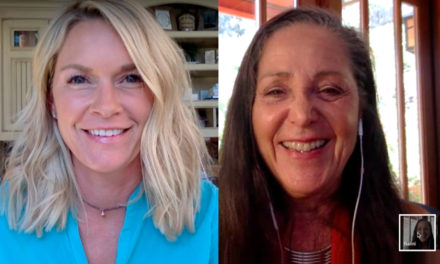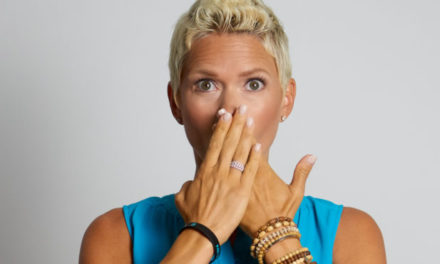 When I tell people I had ovarian cancer, a typical response is, “Wow, that must have been so scary!” I know they mean well but the truth is that actually hearing my diagnosis wasn’t near as scary as the moment when I walked out of the hospital after my FINAL chemo treatment!
When I tell people I had ovarian cancer, a typical response is, “Wow, that must have been so scary!” I know they mean well but the truth is that actually hearing my diagnosis wasn’t near as scary as the moment when I walked out of the hospital after my FINAL chemo treatment!
That reaction is totally normal and it makes sense to me now – I was transitioning from one stage of survivorship to another. I just didn’t understand that yet!
Think about it: For almost two years, I was in fight-to-survive mode. Suddenly, my treatment had ended and my doctors were waving goodbye to me, saying, “OK, peace out, hope things go well, see you in three months.” I felt like I was being pushed off of a cliff with no safety net to catch me. At that moment, I knew I had to take charge of my own journey back to health – but how could I do it alone without my medical experts? What was I supposed to do? What if I messed it all up?
Read more: Questions to ask your oncologist
A huge blessing in meeting others who have fought cancer is realizing I’m not alone in what I’ve experienced physically and emotionally. Another blessing has been Dr. Chasse Bailey-Dorton, Chief of Integrative Oncology at Levine Cancer Institute in Charlotte, N.C., who helped me better understand those feelings.
She introduced me to the National Coalition for Cancer Survivorship, which defines a survivor as being “any person diagnosed with cancer, from the time of initial diagnosis until his or her death.”
But it’s not so simple. Survivorship is like a train ride across the country – you will hit all kinds of peaks and valleys along the way. In 1985, cancer survivor Dr. Fitzhugh Mullan introduced the idea of “seasons of survivorship.” So, each season is like another stop along the train ride.
Dr. Mullan identified four “Seasons of Survival”:
- Acute survivorship, including the time of diagnosis (shock) and treatment.
- Transitional survivorship, when treatment has ended, but survivors may still feel anxious, depressed, and isolated as they engage in ‘watchful waiting’ to see if cancer will return.
- Extended survivorship, which comes in three forms: cancer-free (treatment-free remission); maintained remission (staying cancer-free due to ongoing therapy); or living with cancer (as a chronic, advanced disease that requires continued treatment).
- Permanent survivorship, which has four subgroups, including survivors who are cancer-free and asymptomatic; are cancer free but with long-term/late problems (such as fatigue or depression); develop second cancers (unrelated to earlier treatment); or have secondary cancers (related to earlier treatment).
Read more: Know someone going through cancer treatment? SherryStrong Boxes can help!
Dr. Bailey-Dorton whittled those further to these three stages of survivorship – and part of her job is helping a patient navigate all three:
- From diagnosis to completion of initial treatment
- From completion of treatment to remission, watchful waiting and recovery from treatment
- Long-term survival
“Or as moving from ‘fight mode’ during treatment to ‘I hope it doesn’t come back mode’ after treatment,” she explained.
Dr. Bailey-Dorton described how a patient in stage 1 survivorship and hearing “cancer” for the first time feels “like suddenly being thrown into a hurricane.” Everything seems to happen quickly, and the patient may feel sensations such as a loss of control or increased confusion and fear. Needing to see multiple doctors and undergo multiple tests only adds to a patient’s “fear of things becoming even worse as the extent of cancer is determined,” she explained.
Dr. Kenneth Miller, a former director of the survivorship program at Dana-Farber Cancer Institute, spent his medical career studying cancer but experienced it personally when his wife was diagnosed.
“For years, we probably talked about Joan’s leukemia two or three times a day,” Miller shared on Dana-Farber’s website. “Finally we stopped and moved on to a time when hope and a sense of permanence returned.”
Understanding the seasons or stages of survivorship can help a patient and her family better understand the rollercoaster of emotions but also stay on top of typical health considerations. For example, what are the long-term effects of the treatment I’m taking? Does one type of treatment mean I’ll need to keep an eye out for other issues later?
Read more: Do you know how journaling can help you through cancer treatment?
Right now, I’m in what Dr. Bailey-Dorton considers stage 3, but in my next post, I’ll explain stage 2 of survivorship, which is more immediately after a patient finishes treatment. Not knowing what will happen during this ongoing stage makes me a little nauseous, but I wanted to dive into this topic so I could write about it for you guys! Let me know what you think in the comments below!
More resources on survivorship:
-
Levine Cancer Institute’s Cancer Care Programs
-
Dana-Farber Survivorship Programs (both adult and pediatric):
-
Overview of survivorship: Making Progress for Cancer Survivors
-
Videos of experts discussing different aspects of survivorship
-
-
The National Coalition for Cancer Survivorship:
-
Cancer.net survivorship resources





This hits me on so many levels!! I just started radiation last week which is the final part of my intiatial treatment. I have completed neo-adjuvant chemo and a bilateral mastectomy and I am already having anxiety about the day I finish rads. I have felt some what “safe” when being treated and seeing my docs so regularly. Dr. Bailey-Dorton is also one of my docs and she is Ah-mazing!! Looking forward to you next article on Stage 2!! I am so happy you are doing so great!
Wow, thank you for verifying my feelings. After chemo I was lost, no one told me about support groups, counseling or any resources that could support my adrenaline depletion. After several months I sought out my own path, but I fell a long time from that cliff.
I’m 7 months out of chemo and dealing with the side effects. I’m thinking of making a career change to work in the cancer chain of care because I don’t want others to feel that long fall after treatment. Thank you for this article!!
Hi Sherry! My name is Bernadette Zielinski and I am a Stage 4 OC survivor. I guess I am in Stage 3 as I am on a maintenance drug called Rubraca. I have had two 2 recurrences since my initial treatment (I was dx October 2015) so I’ve only been NED for 3 month (technically). I also see Dr. Bailey-Dorton and will ask her about these stages at my next appointment. Thank you for putting into words the thoughts that have been “ping-poinging” in my head all along! And THANK YOU for keeping OC on the forefront!
While my cancer was breast cancer and not ovarian, I can totally relate! It has been seven very long years for me even though each year after my initial diagnosis, surgery, chemo and radiation, I still wake up EVERY morning and my first thought is: “Will today be the day my cancer returns”? I try so hard to not allow this thought to come to mind, but so far, I have not been successful. I do go for counseling but it really has not helped much. I believe a big part of my issue is that I had NO support system at all. My entire family turned their backs on me and have not spoken to me since just before my diagnosis. NOT one “friend” called me to see how I was doing and I was not doing well at all! I had an allergic reaction to my chemo which has left me with several life-long negative side-effects that I have to deal with daily. My white blood cell count remained just above zero the full eight months of my chemo and I was supposed to be on “house arrest” for anything other than my appointments…which could not be complied with since I did need food, medications, el. al. I feel like I am stuck in Stage 2 of surviving and I truly want to move on but the fear remains. Sherry, you are so very lucky to have my favorite NASCAR driver, Martin, by your side helping you through your journey! (I was SOOOO happy he won today!) May God bless you both and allow you to finally be cancer-free for life! Love to you both! Christine